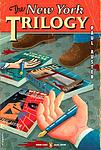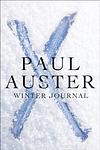Paul Auster
Paul Auster is an acclaimed American author known for his postmodern, genre-blending novels. His works often explore themes of identity, chance, and coincidence. Auster's notable books include 'The New York Trilogy', 'Moon Palace', and 'The Book of Illusions'. He has also worked on films, including 'Smoke' and 'Blue in the Face'. His writing is praised for its complexity and depth.
Books
This list of books are ONLY the books that have been ranked on the lists that are aggregated on this site. This is not a comprehensive list of all books by this author.
-
1. The New York Trilogy
"The New York Trilogy" is a collection of three detective stories that explore the nature of identity and the search for meaning. The stories are set in New York City and feature various characters, including a detective, a writer, and a professor, who are all engaged in their own personal quests. These quests often involve elements of mystery, existentialism, and introspection, and the stories are interconnected in various ways, creating a complex and thought-provoking narrative.
-
2. Moon Palace
"Moon Palace" tells the story of Marco Stanley Fogg, an orphaned young man in New York City who embarks on a journey of self-discovery. As he ventures into the American West and delves into his family's past, he encounters a series of adventures and misadventures that challenge his understanding of identity, love, and the very nature of reality. The novel is a complex and symbolic exploration of American mythology, weaving together themes of solitude, survival, and the pursuit of the American Dream.
-
3. In The Country Of Last Things
In this dystopian novel, the protagonist navigates a decaying, unnamed city where society has collapsed, and survival hinges on scavenging through the ruins. The narrative unfolds through a series of letters she writes, detailing her desperate search for her missing brother amidst the chaos. As she encounters other inhabitants struggling to maintain a semblance of life, the city's pervasive sense of despair and the constant fight for existence challenge her resolve. The story is a poignant exploration of hope, resilience, and the human spirit in the face of overwhelming adversity.
-
4. The Invention of Solitude
"The Invention of Solitude" is a deeply personal and introspective memoir split into two parts, where the author grapples with the concepts of identity, memory, and solitude. The first part focuses on the author's reflections and memories of his late father, while the second part delves into the author's own experience of fatherhood, his life, and his thoughts. The book explores themes of existentialism, the nature of writing, and the complex dynamics of parent-child relationships.
-
5. Leviathan
In this metaphysical detective story, the protagonist's journey unfolds through a series of unexpected events that begin with a mysterious explosion on a highway. The narrative weaves through the protagonist's relationships and encounters, exploring themes of identity, chance, and the complexities of human connection. As the protagonist delves into the life of a friend who may be connected to the explosion, the story examines the political and personal motives that drive individuals to extreme actions. The novel is a contemplation on the nature of fate and the search for meaning in a seemingly random and chaotic world.
-
6. City of Glass
A struggling author becomes entangled in a complex mystery when he receives a wrong-number call asking for a private detective. After impulsively deciding to take on the role, he is hired to protect a man from his mentally unstable father who has recently been released from prison. As he delves deeper into the case, the lines between fiction and reality blur, leading him on a metaphysical exploration of identity and purpose.
-
7. Winter Journal
This book is a reflective and deeply personal memoir that navigates through the memories, sensations, and experiences of the author's life. Written from the second-person perspective, it offers an intimate look into the author's journey from childhood to the cusp of old age. The narrative delves into the physical experiences and emotional landscapes that have shaped him, from the joys and sorrows of love, the pleasures of the senses, to the scars and vulnerabilities of the body. It is a contemplative exploration of the author's life, examining the moments that have defined him, the paths taken and not taken, and the nature of memory itself. Through this introspective journey, the memoir presents a mosaic of a life lived with passion, curiosity, and an unyielding quest for meaning.






